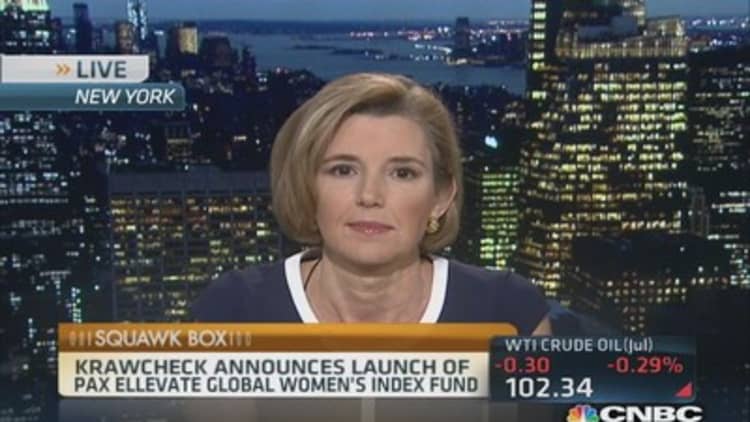While their husbands are still alive, few women plan to leave their financial advisor.
Yet in the months and years after they become widows, up to 70 percent do just that, according to some estimates.
Even with greater equality between the sexes, gender differences remain in many marriages, with men often taking lead on finances. According to a survey by Fidelity Investments, women do not believe in their ability to be financial decision makers. But more than half of men do have confidence in their own abilities—and their spouses have more faith in their abilities, too. Surprisingly, younger women hold this view the most.
So when it comes to working with a financial advisor, men are often the main point of contact, and some women view those relationships as their husbands'.
"Then, when the husband dies, the advisor turns on the charm," said certified financial planner Eve Kaplan of Kaplan Financial Advisors. "The advisor is suddenly very interested in the widow, but it's basically a new relationship."
Read MoreSavvy widows transform their lives
Among Kaplan's clients are widows who have left their previous advisors and are striking out on their own.
Lots of reasons for leaving
Karen Altfest, principal advisor with Altfest Personal Wealth Management, understands why some advisors pay more attention to husbands. If the husband is the half of the couple who has the investment savvy and expresses the interest, advisors probably find it easier to direct the conversation his way.
But that doesn't mean that wives aren't part of the decision making. Even when if women don't contribute much during a meeting, "you can be 100 percent sure that she's talking to the guy on the car ride home," said Altfest.
Read MoreSudden wealth can leave you broke
Sometimes certain women, such as Kaplan's clients, go looking for a new advisor who is theirs alone. It's understandable that women would leave an advisor who hasn't cultivated a relationship with both halves of a couple equally, said Laura Kogen, vice president of practice management at Fidelity.
"An advisor should never say, 'My client and his wife,'" Kogen said. "Advisors are going to have to find ways to engage the wife well before the topic of widowhood comes up."
Other times, the new advisor is not an improvement, but the opposite. Widows may fall prey to a hard pitch for annuities and other expensive guarantees they may not need.
"When someone dies, it's in the newspaper and people come out of the woodwork," explained Kogen. "Widows are suddenly listening to a whole new set of influencers."
Read MoreWhich spouse should control finances?
Annuities, marketed with talk of guarantees and "money for life," may sound especially comforting to someone whose world has been turned upside down.
"Widows haven't just lost a spouse, they've also lost their sounding board," said investment advisor and financial planner Fatima Iqbal of Azzad Asset Management. Advisors who spend more time explaining all of their clients' options can prevent them from making poor choices, Iqbal added.
Some stay loyal
When women stay with advisors, it's usually because their advisors spent a lot of time with them upfront.
Drawing out clients who are not engaged with their finances is time-consuming, conceded Altfest of Altfest Personal Wealth Management. They lack confidence in their ability to make prudent financial decisions and may need the most basic financial education in order to participate in conversations with their advisors.
Read MoreWomen face financial roadblocks
"I've had some women clients where I've had to say, 'Do you know what a stock is? Do you want me to explain it to you?'" Altfest said.
Robert Schein, a partner and managing director with the HighTower Palm Desert advisory practice, said his firm's policy is never to meet alone with just one spouse.

During client meetings, he asks wives and husbands their joint goals and objectives, and then asks them individually the same thing. It's a way to get both parties talking and be equally engaged.
Schein speaks from personal experience. His mother faced the prospect of managing her own money for the first time shortly before his father died of cancer.
Read MoreBusiness not easy when families fray
While Schein and his brother both work in finance, they didn't want to swoop and take over their mother's finances— and that's not what she wanted anyway. Instead, Schein helped prepare her for a life of solo financial management.
Given that women will live an average of 14 years after their husbands die, they'll need a good dose of confidence to manage their money alone. So Schein, who is 38, started a leadership forum to give women the tools to face their financial challenges at different points in their lives. It's called the Society of Financially Empowered Women, or SO FEW.
This assumption that the wife is going to be same as the husband, that she will share the same values, is wrong.Fatima Iqbalinvestment advisor and financial planner, Azzad Asset Management
A plan of their own
One mistake some advisors make is that they assume the financial plan the couple had before the husband's passing will continue as is. But a widow may have lost a source of income when her spouse died and she may be more risk-averse than her husband was. In other words, she needs a different financial plan.
"This assumption that the wife is going to be same as the husband, that she will share the same values, is wrong," said Iqbal of Azzad Asset Management. "She may have different financial needs now."
Schein at HighTower Palm Desert sees it differently. Advisors make a mistake by investing one way for the couple and a different way for a widow. "That would happen if the wife wasn't there at the table and didn't build the plan with the advisor," he said. "There's no reason why you'd have to course-correct if you didn't start the plan at the very beginning with that in mind."
Read MoreTake time to pick the right advisor
And when it comes to money, the sexes do see things differently. For all their lack of confidence, women end up being better investors. Men tend to be impatient, while women prefer to focus on the long-term. According to a Vanguard study on individual investors' behavior, women were less likely to sell their stocks during the 2008 and 2009 downturn.
Advisors who know how to deal with both the male and female mindsets are the most likely to keep women clients when they become widows.
—By Ilana Polyak, special to CNBC.com




